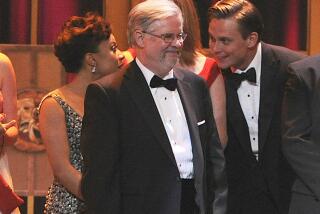Beryl Bainbridge dies; British novelist chronicled human relationships
Acclaimed British novelist Beryl Bainbridge, an acute and acerbic chronicler of human relationships, died Friday of cancer in a London hospital, said Ed Wilson of her literary agency Johnson and Alcock. She was believed to be 77.
Bainbridge was born in the port city of Liverpool in northwest England. Her agent, and her entry in Who’s Who, gave the date as Nov. 21, 1934, but records show her birth was registered early in 1933. Bainbridge sometimes said she struggled to remember her birthdate ever since she lied about her age so she could take a trip to France as a youngster without her parents’ knowledge.
The gritty spirit of Bainbridge’s home city informed her books, which blended humor, tragedy and the absurd.
“All the books I’ve written, even the historical ones, came from the place of my birth, the characters based on my parents and relations,” she said.
She published more than 15 novels, including “A Weekend With Claud,” “The Bottle Factory Outing” and “Injury Time.”
Several drew directly on Bainbridge’s experiences. Her early career as an actress in provincial theater provided the setting for the tragicomic “An Awfully Big Adventure,” published in 1989 and made into a 1995 movie starring Alan Rickman and Hugh Grant.
As time went by, she increasingly turned to historical settings. “Every Man for Himself” was set aboard the Titanic and “Master Georgie” in the Crimean War, while “According to Queeney” looked at 18th century lexicographer Samuel Johnson. “Young Adolf” imagined the aspiring artist Hitler in Liverpool before World War I, to comic and disturbing effect.
“Beryl had an absolutely original voice: she was a serious comedian, all of whose novels ended tragically,” writer Michael Holroyd told the Guardian newspaper.
Bainbridge was a five-time finalist for the Man Booker Prize, and twice won the Whitbread literary prize.
Kent Carroll, Bainbridge’s American publisher at Europa Editions, called her “a wonder, kind and generous with a fine, subtle sense of humor about the absurdity of it all.”
Robustly outspoken — she was no fan of chick lit, which she dismissed as “froth” — Bainbridge was unsentimental about life’s hardships.
In her 20s, she attempted suicide, an event she later said she was ashamed to remember.
“Putting one’s head in the oven, yes, I think I was probably trying to draw attention to myself,” she said. “I am terribly ashamed. I was a bit miserable. When one is young one has these ups and downs.”
Despite her reputation as an iconoclast, Bainbridge was delighted to be made a dame, the female equivalent of a knight, by Queen Elizabeth II in 2000. The British government called her death “a terrible loss.”
“For over 40 years, she has been rightly recognized as one of the world’s greats, with an original voice and tremendous spirit,” Culture Minister Ed Vaizey said.
At the time of her death, Bainbridge was working on “The Girl in the Polka-Dot Dress,” a novel set around the assassination of Robert F. Kennedy.
She is survived by two daughters and a son.
More to Read
Start your day right
Sign up for Essential California for the L.A. Times biggest news, features and recommendations in your inbox six days a week.
You may occasionally receive promotional content from the Los Angeles Times.






